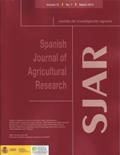Ver ítem
- xmlui.general.dspace_homeCentros Regionales y EEAsCentro Regional Buenos Aires SurEEA BalcarceArtículos científicosxmlui.ArtifactBrowser.ItemViewer.trail
- Inicio
- Centros Regionales y EEAs
- Centro Regional Buenos Aires Sur
- EEA Balcarce
- Artículos científicos
- Ver ítem
Differential quality and technical/managerial advice relationships in Andalusian (Spain) olive oil protected designations of origin
Resumen
A relevant topic investigated in ‘Local Agro-Food Systems’ studies (LAFS) is the key role of collective action in the dissemination of innovations and knowledge aimed at the organization of quality on a local scale. The scope of this article deals with the methodological tools for typifying the relationships made, in LAFS hosting a Protected Designation of Origin (PDO), between the relational social capital and the differential quality of firms. The
[ver mas...]
A relevant topic investigated in ‘Local Agro-Food Systems’ studies (LAFS) is the key role of collective action in the dissemination of innovations and knowledge aimed at the organization of quality on a local scale. The scope of this article deals with the methodological tools for typifying the relationships made, in LAFS hosting a Protected Designation of Origin (PDO), between the relational social capital and the differential quality of firms. The objective of this work is to categorize the agro-industrial firms into hierarchies for implementing rural development policies, with respect to their technical and managerial advice relationships and their score achieved in terms of product and process quality. The study takes into account the LAFS of “Estepa” and “Sierra de Segura”, Andalusia (S Spain), corresponding to two important olive oil PDOs. The methodological approach comprises, firstly, the elaboration of a quality synthetic indicator on processes and products of the mills. Secondly, social network analysis is applied to the technical/managerial advice networks of the mills. Thirdly, a mill typology was established by means of factor analysis which employs quality and relational indicators. It is proved that the Regulatory Boards, as well as the second-step cooperatives, can assume a role of integrating poles with respect to the collective action developed in the LAFS, particularly in terms of dissemination of knowledge and innovations, which enhances the process and product quality of local firms. The existence of networks is a necessary condition to improve and homogenize the quality in a diffuse local agro-food structure.
[Cerrar]

Autor
Cendon, Maria Laura;
Sanz Cañada, Javier;
Lucena Piquero, Delio;
Fuente
Spanish Journal of Agricultural Research 12 (4) : 869-888 (2014)
Fecha
2014-10-21
Editorial
Instituto Nacional de Investigación y Tecnología Agraria y Alimentaria (INIA)
ISSN
1695-971X (print)
2171-9292 (on line)
2171-9292 (on line)
Formato
pdf
Tipo de documento
artículo
Palabras Claves
Derechos de acceso
Abierto
 Excepto donde se diga explicitamente, este item se publica bajo la siguiente descripción: Creative Commons Attribution-NonCommercial-ShareAlike 2.5 Unported (CC BY-NC-SA 2.5)
Excepto donde se diga explicitamente, este item se publica bajo la siguiente descripción: Creative Commons Attribution-NonCommercial-ShareAlike 2.5 Unported (CC BY-NC-SA 2.5)


